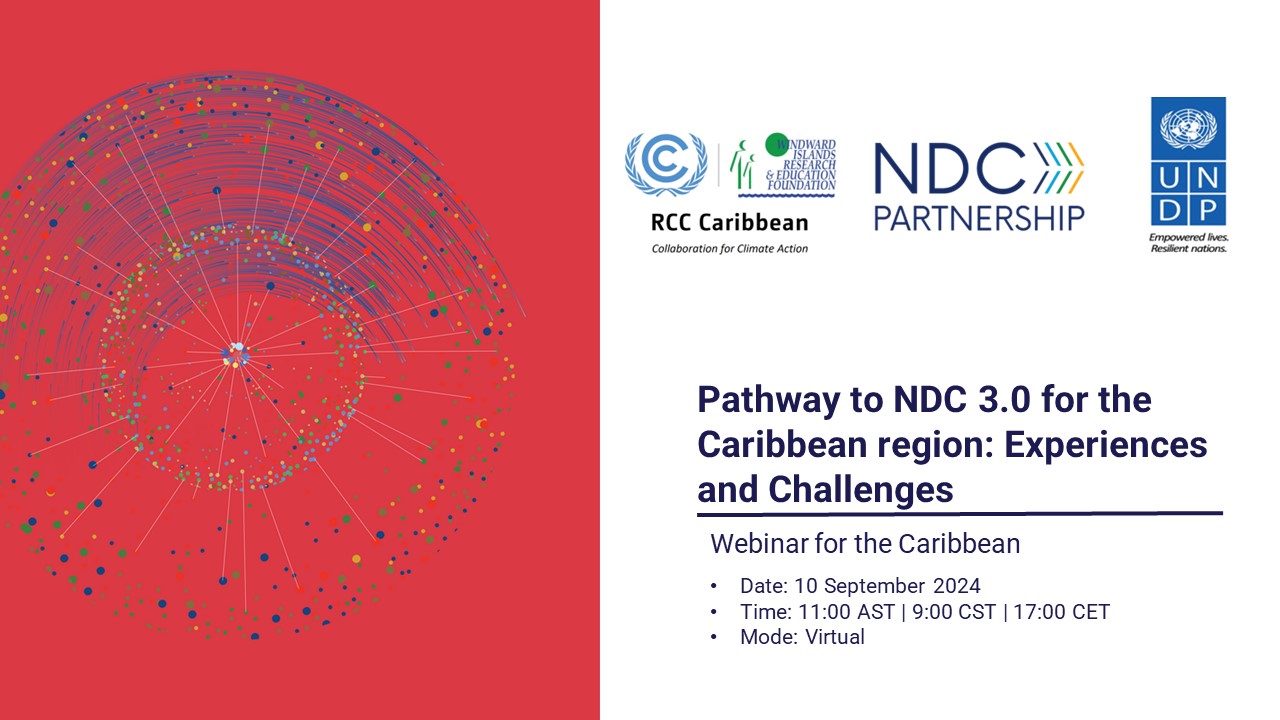Background
It is a critical time as the next round of Nationally Determined Contributions (NDCs) due in 2025, requires new and more ambitious targets from countries. The Global Stocktake (GST) outcome agreed upon at COP28 underlined that despite overall progress on mitigation, adaptation and means of implementation and support, Parties are not yet collectively on track towards achieving the purpose of the Paris Agreement and its long-term goals, and encouraged Parties to come forward with ambitious, economy-wide emission reduction targets, covering all greenhouse gases, sectors and categories and aligned with the 1.5°C limit in their next round of NDCs.
Most countries in the Caribbean region have prepared and communicated their first and second generation NDCs which have yielded valuable insights on the opportunities and challenges that countries face when developing national climate change targets. Sharing experiences among countries within the region encourages the transfer of lessons learnt and collective progress towards achieving the goals outlined in Article 2 of the Paris Agreement.
The GST Outcome also invited the secretariat including their Regional Collaboration Centers (RCCs) and organizations in a position to do so, to provide capacity-building support for the preparation and communication of the next NDCs.
Webinar Objective
RCC Caribbean, along with the NDC Partnership and the United Nations Development Programme (UNDP), are therefore organizing this webinar to facilitate a space for the exchange of knowledge and experiences among Caribbean countries regarding the opportunities and challenges faced in the preparation and updating of their NDCs. Through this session, we seek to share best practices, identify common challenges and foster collaboration among the countries of the region.
The objectives are to create the space for countries to share information on:
- successful practices and key challenges in the previous NDC preparation cycles
- current process being undertaken for the preparation of NDC 3.0
- suggestions for enhancing ambition in the next cycle of NDCs
Summary
The webinar saw the attendance of 59 participants including government representatives from 10 Caribbean countries and organizations.
During the session, the role of UN Climate Change and the RCCs in delivering capacity-building support for countries to prepare and communicate their next round of Nationally Determined Contributions (NDCs) was emphasized, along with the importance of partnerships to align NDC 3.0 with the 1.5°C goal of the Paris Agreement. Key elements such as the goals of the Paris Agreement, the ambition cycle, and the Global Stocktake outcomes were showcased, providing guidance for NDC development. The UNDP’s Climate Promise 2025 initiative and broader UN coordination efforts were presented, while the NDC Partnership (NDCP) highlighted the global call for NDC 3.0 and Long-term Low Emission Development Strategies (LT-LEDS), open until autumn 2025, with a demonstration of the NDC 3.0 Navigator tool.
Representatives from three countries in the region shared their NDC experiences and challenges. One common approach expressed by all countries is the involvement of a broad range of stakeholders during the NDC preparation process including government agencies, civil society, private sector representatives, and international partners, ensuring alignment with national policies and international commitments.
Some key takeaways from the session included:
- direct interactions between country representatives requesting recommendations on the NDC 3.0 preparation process, for example, the representative from Bahamas reached out to Belize asking about their strategy to ensure that the youth perspectives are captured and included throughout the NDC process and upcoming submission;
- unlocking opportunities for additional support on NDCs 3.0 through the support ecosystem that is in place in the region, specifically connecting the representative from Haiti with the NDC Partnership on the global call for NDCs and LT-LEDS, and;
- participation from a number of regional and international organizations on the call including representatives from the European Union who appreciated the discussions and requested the RCC Caribbean to share the list of participants and email contacts.
Watch the event again
Credit: UN Climate Change
Key insights and takeaways
In his opening remarks, Vintura Silva, Team Lead in the NDC Technical Support unit at the UNFCCC secretariat, emphasized the role of UN Climate Change and the RCCs for delivering capacity-building support to countries in NDC preparation and communication. He stressed the importance of collaboration with key partners to align NDCs 3.0 with the goals of the Paris Agreement to limit the global temperature rise to 1.5°.
RCC Caribbean delivered a presentation on NDC implementation, transparency reporting, and collective review through the global stocktake (GST). The team also covered guidance for NDCs including past CMA decisions and an explanation on the support framework for NDCs 3.0.
Annlyn McPhie, Technical Specialist for Climate Change at UNDP, presented the rollout of their Climate Promise 2025 initiative, which focuses on ambition, acceleration and inclusivity. She also provided information on the UN system-wide coordination to support NDC 3.0 delivery.
Jeniffer Hanna Collado, LAC Regional Manager at the NDC Partnership, highlighted the global call for NDCs 3.0 and Long-Term Low-Emission Development Strategies (LT-LEDS). This initiative aims to gather resources and expertise to support countries in updating their NDCs and LT-LEDs and is open till the third quarter of 2025 The team also demonstrated the NDC 3.0 Navigator, encouraging participants to use and provide feedback on the tool.
Lessons learned
Representatives from three countries in the region shared their NDC experiences and challenges:
-
Belize identified main gaps in the previous NDC round, including insufficient data, technical capacity and financial constraints. The updated NDC 3.0 will emphasize adaptation, particularly the area of loss and damage. They emphasized the importance of involving a broad range of stakeholders from the beginning, aligning NDCs with other national plans including LEDS and national adaptation plans (NAPs), and ensuring early engagement with the Ministry of Finance to secure financing.
-
Haiti highlighted significant challenges, such as political instability, lack of comprehensive data, inadequate funding and shortage of technical expertise. They reported that efforts are underway to build technical capacity through workshops and training, with a focus on enhancing stakeholder engagement, particularly with the private sector. Haiti also noted the need to address previously overlooked areas such as loss and damage and the blue economy.
-
Jamaica's NDC focuses on key sectors with established policies and data, such as energy and forestry. The country has started their NDC preparation process earlier and is developing its capacity through training and workshops, after learning from previous experience. This proactive strategy has helped improve stakeholder involvement by increasing awareness and preparedness. Jamaica also stressed the use of robust methodologies and modelling tools to support the credibility of its NDC.

